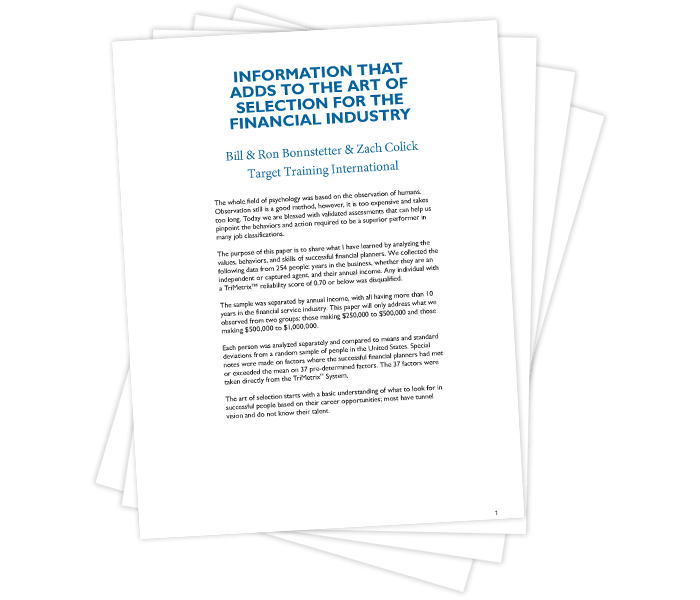
Feb 17, 2022
The most successful financial planners are those that possess a high level of versatility and are able to easily adapt to change. They understand people very well, but they are also very focused on attaining good results. Because of the nature of their business, they are very structured and adhere to financial systems. They understand their roles and take pride in their work. While they focus on the present, many have the drive to further advance their careers and become even more successful.
The information presented in this paper to observe successful and un-successful financial planners. These observations will also carry over into other sales fields.

Feb 17, 2022
20% of success in any career is believed to be based on intelligence: the ability to learn, understand and reason. The other 80% is based on the ability to understand oneself and interact with other people (Kirch, Tucker & Kirch, 2001).” An incremental laboratory experience was designed to create an environment for soft skill development that does not diminish the attention to accounting theory and technical development. Mandatory experiences were added to two required accounting classes starting in the spring of sophomore year. The lab experience includes: (1) Professional Motivation, (2) Emotional Intelligence, (3) Soft Skill Development, (4) Career Skills, and (5) Time Management.

Dec 2, 2021
The following manual contains information on the history and development of the concept of motivation from its beginnings to current implementation of these concepts as psychometric assessments. Included in this manual are a host of mathematical, statistical, and psychometric analyses used to establish evidence of validity and reliability of the TTI Success Insights Motivation Insights assessment.

Aug 20, 2021
This paper demonstrates that when education programs are delivered as if all students have identical learning styles and needs, the students with unique learning styles are put at a disadvantage. On the other handed the authors also describe how the application of digital technology, in particular, the Internet of Things (IoT), is making inclusion possible and democratized education affordable.

Aug 20, 2021
This research provides data driven insights that can be used by engineering educators to better understand distinct segments of undergraduate students. Three clusters emerged that delineated students into three distinct typologies: Steadiness Compliance (SC); Influencing Steadiness (IS) and Dominance Influencing (DI) typology. This affirms once again that students are unique and individual differences require different teaching and learning approaches.




